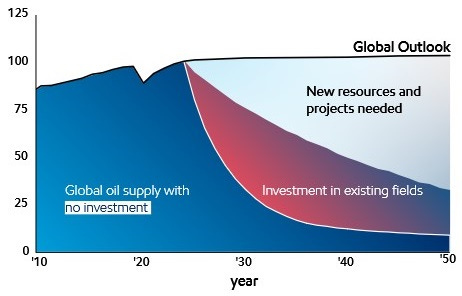Process Safety: Change on the Horizon
Yesterday’s post ― Industrial Decline ― described the de-industrialization that has been taking place in Europe over the last 20 years or so. Various reasons have been put forward as the cause of this trend. One of those reasons is the high cost of energy.
It seems likely that this problem will become worse. Late last year we published the post An Extraordinary Report. At the heart of that post is the following image, which was published by the ExxonMobil (XOM) company.
Based on the XOM report and the image just shown we said,
The world’s demand for oil in the last decade has risen from about 86 to 95 in millions of barrels per day. In spite of the growth in alternatives, such as solar panels and EVs, we are using ever increasing amounts of oil. The new sources of energy are supplementing, not replacing the fossil fuels.
The report assumes that long-term demand for oil through the year 2050 remains flat at about 100 million barrels per day. This assumption is not explained, but it may be based on an expectation that new sources of energy will start to replace the fossil fuels, in spite of their low energy density.
Oil supplies start to plummet around the year 2026 (that’s just a year and a half from now).
ExxonMobil concludes:
There will be continued high demand for oil and gas through 2050 and beyond.
Climate policies and decarbonization efforts will be slow or limited, especially in developing nations.
Oil and gas will remain ‘essential and irreplaceable’ in the global energy mix for decades.
Not everyone agrees with the report’s assessment. Critics such as the IEA, Carbon Tracker, and climate NGOs, argue that ExxonMobil’s outlook serves more as a justification for continued fossil fuel investment than a neutral forecast. They point out that it disregards growing political commitments to Net-Zero goals and underestimates the accelerating pace of renewable energy deployment and technological innovation.
However, if oil supply begins to decline sharply in the near-term, as the data suggest, and alternatives remain inadequate in scale or reliability, then the price of energy will rise. For energy-intensive industries, particularly in Europe, this could mean an even faster erosion of competitiveness, and an acceleration of the deindustrialization trend already underway.
In the short term this means that process safety professionals will have fewer work opportunities. However, the longer-term picture suggests that structural changes are on the way, which further suggests that the process safety discipline will need to change and adapt. If it does so, process safety professionals could play a key role in the transitions lies ahead of us.






